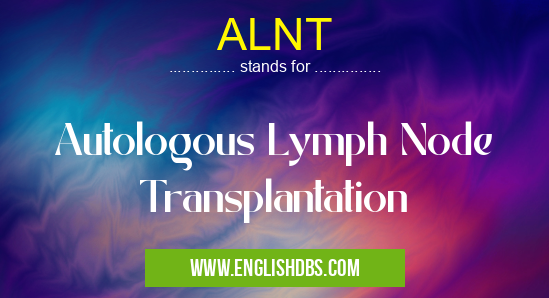What does ALNT mean in TRANSPLANTATION
Abbreviations are used commonly in our day to day lives, and even in medical terminology. ALNT stands for Autologous Lymph Node Transplantation. It is a type of medical procedure involving the transplantation of lymph nodes from one part of the body to another.

ALNT meaning in Transplantation in Medical
ALNT mostly used in an acronym Transplantation in Category Medical that means Autologous Lymph Node Transplantation
Shorthand: ALNT,
Full Form: Autologous Lymph Node Transplantation
For more information of "Autologous Lymph Node Transplantation", see the section below.
Meaning
Autologous Lymph Node Transplantation, or ALNT, is a process in which lymph nodes are taken from one area of the body and transplanted or grafted into another area. The procedure usually involves transferring them to areas affected by lymphatic diseases such as lymphedema, an accumulation of lymphatic fluid that causes swelling and pain due to blocked pathways. During the operation, healthy lymph nodes are removed from unaffected areas where they can be easily accessed and then transplanted elsewhere to replace damaged nodes or provide additional drainage pathways for fluids. The process helps improve patients’ circulation and mobility by providing additional drainage opportunities for excessive fluid buildup.
Procedure
The typical procedure involves first removing healthy lymph nodes from unaffected parts of the body such as the inguinal region (groin) or supraclavicular region (underneath the collarbone). These removed tissues are then surgically transplanted into other areas where there has been damage caused by either injury or disease. Typically, this transplantation takes place under general anesthesia. Reconstructive surgery may also be required afterwards to help with any changes in tissue shape or appearance that have occurred during the operation.
Benefits
Autologous Lymph Node Transplantation has numerous benefits to patients suffering from a variety of conditions including lymphedema, breast cancer-related lymphedema, post-mastectomy arm swelling and many more. The procedure helps improve circulation throughout affected areas by providing more efficient drainage channels for fluids that otherwise could not move freely without assistance. The transplantation itself also allows greater flexibility when it comes to how much tissue needs to be moved depending on individual patient needs.
Essential Questions and Answers on Autologous Lymph Node Transplantation in "MEDICAL»TRANSPLANTATION"
What is Autologous Lymph Node Transplantation?
Autologous lymph node transplantation (ALNT) is a type of stem cell transplant widely used to treat malignancies such as Hodgkin’s and Non-Hodgkin’s Lymphoma, Multiple Myeloma and Leukemia. In this procedure, stem cells harvested from the patient are injected back into the patient in order to regenerate healthy immune system cells and replace those lost due to chemotherapy or radiotherapy.
Who is considered a suitable candidate for ALNT?
ALNT may be recommended for patients who have failed conventional treatments for their cancer, who have relapsing tumors or who are at high risk of recurrence after completing standard treatments. The best candidates are those with relatively good health status and reasonable life expectancy.
What are the risks of ALNT?
As with any medical procedure, there are some potential risks associated with ALNT, including infection, graft-versus-host disease (GVHD), organ damage and even death. Patients should discuss these risks in detail with their healthcare provider prior to proceeding with the treatment.
How long does it take for autologous lymph node transplantation to be done?
Typically, the procedure can be completed in about 4-6 weeks depending on various factors such as donor availability and medical condition of the recipient. This includes approximately 2 weeks for stem cells collection from the donor and another 2-4 weeks required for administering chemotherapy before transplantation is done. Additionally, post-transplant follow-up care may involve additional visits over a period of multiple months or years.
What is the success rate of ALNT?
Research indicates that autologous lymph node transplantation has been successful in treating different types of hematologic malignancies such as Hodgkin’s & Non-Hodgkin’s Lymphoma, Multiple Myeloma & leukemia & other blood disorders in most patients. However, outcomes vary depending on individual cases and some may not experience complete remission from tumor cells even after transplantation.
How soon can one resume work after an ALNT?
It depends upon individual case but typically one should anticipate up to 3 months away from work including hospitalization time during collection/transplant phase & recovery afterwards before resuming work again. For certain jobs like involving heavy lifting or hazardous environment it might require 3-6 months before returning back to normal job duties & lifestyle activities again.
Final Words:
ALNT is a relatively new form of treatment for those suffering from a variety of different medical conditions related to lymphedema or fluid accumulation in certain areas of their bodies. It offers improved results while still being minimally invasive compared with other treatments that require extensive surgical dissection under general anesthesia. With its numerous advantages over other methods, we expect it will continue to grow in popularity as an effective way for people suffering from these ailments to reclaim their quality of life.
